

Personal Reading. Chade-Meng Tan: Everyday compassion at Google. Mindfulness can increase wellbeing and reduce stress in school children. Mindfulness – a mental training that develops sustained attention that can change the ways people think, act and feel – could reduce symptoms of stress and depression and promote wellbeing among school children, according to a new study published online by the British Journal of Psychiatry.
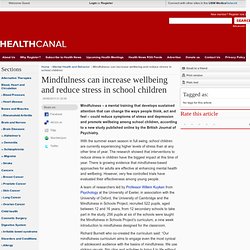
With the summer exam season in full swing, school children are currently experiencing higher levels of stress than at any other time of year. The research showed that interventions to reduce stress in children have the biggest impact at this time of year. There is growing evidence that mindfulness-based approaches for adults are effective at enhancing mental health and wellbeing.
However, very few controlled trials have evaluated their effectiveness among young people. Richard Burnett who co-created the curriculum said: “Our mindfulness curriculum aims to engage even the most cynical of adolescent audience with the basics of mindfulness. All the pupils were followed up after a three month period. Teaching Mindfulness to Kids. Stress isn't reserved for adults.
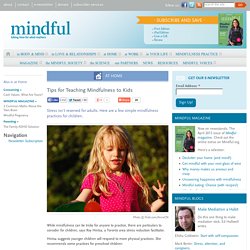
Here are a few simple mindfulness practices for children. Photo © flickr.com/AnneCN While mindfulness can be tricky for anyone to practice, there are particulars to consider for children, says Roy Hintsa, a Toronto area stress reduction facilitator. Hintsa suggests younger children will respond to more physical practices. She recommends some practices for preschool children: Have your child lie down on a mat on the floor, or on their bed, and place their favourite stuffed animal on their belly.
To read the full list of tips, click here. Hintsa also has tips for practicing with the whole family, like taking three mindful breaths before eating together, and sharing one grateful moment you had that day at bedtime. Mindfulness in Education - Mindfulness Meditation Exercises. Introducing Programs to Fit Your School’s Needs Mindfulness-based social emotional learning (MBSEL) programs from Inner Explorer enhance traditional education by promoting ‘Learning from the Inside Out’.
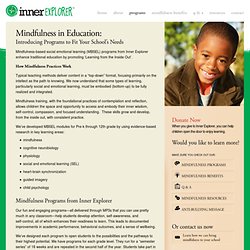
How Mindfulness Practices Work Typical teaching methods deliver content in a “top-down” format, focusing primarily on the intellect as the path to knowing. We now understand that some types of learning, particularly social and emotional learning, must be embodied (bottom-up) to be fully realized and integrated. Mindfulness training, with the foundational practices of contemplation and reflection, allows children the space and opportunity to access and embody their inner wisdom, self-control, compassion, and focused understanding. 8 Ways to Teach Mindfulness to Kids We know mindfulness is good for us.
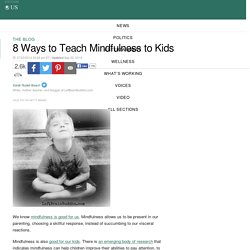
Mindfulness allows us to be present in our parenting, choosing a skillful response, instead of succumbing to our visceral reactions. How We Can Teach Our Children Mindfulness. MINDFULNESS FOR CHILDREN. Mindful awareness exercises help children develop concentration and self-awareness.
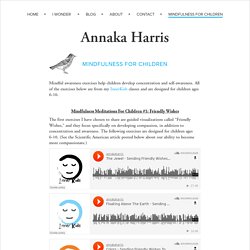
All of the exercises below are from my InnerKids classes and are designed for children ages 6-10. Mindfulness Meditations For Children #1: Friendly Wishes The first exercises I have chosen to share are guided visualizations called “Friendly Wishes,” and they focus specifically on developing compassion, in addition to concentration and awareness. The following exercises are designed for children ages 6-10. (See the Scientific American article posted below about our ability to become more compassionate.)
Annie Murphy Paul: Can Mindfulness Technique Help Us Focus? If there’s any time when we should be paying close attention to what we’re doing, it’s when we’re under pressure to perform — whether taking a test like the SAT or on a deadline at work.
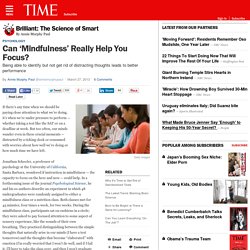
But too often, our minds wander even in these crucial moments — distracted by a ticking clock or consumed with worries about how well we’re doing or how much time we have left. Jonathan Schooler, a professor of psychology at the University of California, Santa Barbara, wondered if instruction in mindfulness — the capacity to focus on the here and now — could help. In a forthcoming issue of the journal Psychological Science, he and his co-authors describe an experiment in which 48 undergraduates were randomly assigned to either a mindfulness class or a nutrition class.
Both classes met for 45 minutes, four times a week, for two weeks. 5 Foolproof Ways to Feel More Joy in 2015. Christine Carter talks with James Baraz, author of Awakening Joy.
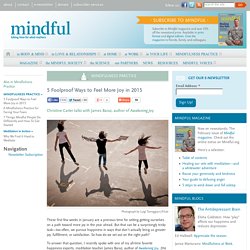
Photograph by Luigi Torreggiani/Flickr These first few weeks in January are a precious time for setting getting ourselves on a path toward more joy in the year ahead. But that can be a surprisingly tricky task—too often, we pursue happiness in ways that don’t actually bring us greater joy, fulfillment, or satisfaction. So how do we set out on the right path? To answer that question, I recently spoke with one of my all-time favorite happiness experts, meditation teacher James Baraz, author of Awakening Joy. Here is a condensed version of our conversation. The SCIENCE.
Hacking Mindfulness: Learning to Pay Attention to Your Own Attention, with Peter Baumann. Transcript Peter Baumann: The most difficult we have today is our attention gets hijacked.
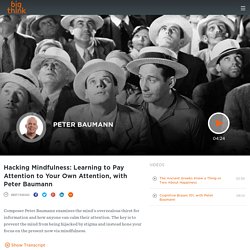
There is so much happening in our lives that we pay attention to and quite frankly, you know, the little devices that we carry around don’t help very much because our attention gets totally absorbed into that attraction from these little devices. And we get a little bit of dopamine all the time when we get information, information is valuable instinctively. So we want to know what’s happening and what’s going on. That’s true for gossip and it’s true for why we watch the news. I think to begin with it would be really valuable to become aware of attention and how it automatically shifts from one to the other. So attention is a wonderful capacity, you know. It’s not always right to say I’m mindful, I’m mindful, I’m mindful. Directed/Produced by Jonathan Fowler, Elizabeth Rodd, and Dillon Fitton.